Oscar winner Pawel Pawlikowski will be in London to celebrate this year’s Kinoteka Polish film festival. Joining him are veteran Polish auteur KRZYSZTOF ZANUSSI with his latest film Ether, a spotlight of female filmmakers and a special Sci-fi retro strand featuring cult classic gems from STANISŁAW LEM.
Another highlight will be the latest film from maverick wild child Andrzej Żuławski – On the Silver Globe. The festival will also showcase the work of legendary cinematographer WITOLD SOBOCIŃSKI and a documentary exploring the provocative work of Walerian Borowczyk
OPENING NIGHT GALA at Regent Street Cinema with a screening of ANOTHER DAY OF LIFE, a beautifully animated adaptation of acclaimed Polish journalist Ryszard Kapuściński’s early book.
CLOSING NIGHT GALA – Another chance to enjoy Pawel Pawlikoski’s Oscar-nominated COLD WAR’. The charismatic director will be there to present his film. The event is followed by a dinner with live music from Zbigniew Namyslowski, former collaborator of the legendary film composer Krzysztof Komeda (The Fearless Vampire Killers/Polanski) followed by a gourmet menu inspired by Polish folk cuisine.
NEW FEMALE FILMMAKERS
Female filmmakers from Poland get their own special side-bar this year at the BFI Southbank with Jagoda Szelc’s deeply unsettling psychological horror MONUMENT, Olga Chajdas’s award- winning LGBT romance NINA and the disorientating and acclaimed new film from director of THE LURE, Agnieszka Smoczynska’s FUGUE.
RETROSPECTIVES
Two SCI-FI extravaganzas are on offer at this year’s festival: A major retrospective from one of the godfathers of modern sci-fi STANISŁAW LEM will take place at the Barbican. This includes the rare Russian television film SOLYARIS and the East German space opera SILENT STAR. The Quay Brothers also present their film MASK followed by a panel discussion about Lem’s legacy and the challenges of adapting his work to the screen.
Andrzej Żuławski ON THE SILVER GLOBE – will screen at the Horse Hospital alongside an exhibition of costumes and ephemera from the film. Shut down by the Communist party in 1977 after 80% of the footage was shot, the film was luckily saved by the crew who ignored orders, and Żuławski’s fantastical creativity was preserved.
https://youtu.be/zdpl1mjutN4
KRZYSZTOF ZANUSSI – The renowned auteur will be there to present his latest film ETHER and introduce his 1971 classic FAMILY LIFE.
WITOLD SOBOCIŃSKI – the influential DoP’s work is celebrated at Close-Up Cinema with four archive screenings: Zanussi’s FAMILY LIFE, Jerzy Skolimowski’s HANDS UP!, THE HOURGLASS SANATORIUM from director Wojciech Has and Andrzej Żulawski’s THE THIRD PART OF THE NIGHT.
NEW POLISH CINEMA
Taking place at Regent Street Cinema, ICA and Watermans, the New Polish Cinema programme offers a selection of ten films encompassing the exciting breadth of contemporary Polish filmmaking – from the brutal realism of Piotr Domalewski’s SILENT NIGHT to Filip Bajon’s epic costume drama THE BUTLER via the hysterically funny situational humour of Paweł Maślona’s PANIC ATTACK.
DOCUMENTARIES
The ICA’s festival documentary strand includes an intimate look at life’s final moments in END OF LIFE and an examination of the provocative work of Walerian Borowczyk in LOVE EXPRESS: THE DISAPPEARANCE OF WALERIAN BOROWCZYK.
KINOTEKA FILM FESTIVAL 2019 | Barbican, BFI Southbank, Close Up Cinema, Frontline Club, ICA, Tate Modern, The Horse Hospital, Regent Street Cinema and Watermans Art Centre (Cambridge).


